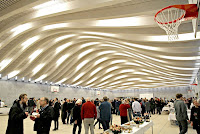BIG conceived a large multifunctional space that could be used for sports, graduation ceremonies and social events. The new hall comprises a sunken 1,100 m2 space, placed five meters (16.5 feet) below the ground in the center of the school’s courtyard, ensuring a good indoor climate, low environmental impact and high architectural quality.
The hall, formed by bevelled concrete walls, is covered by a soft vaulted wooden roof formed by a series of uniquely curved glued laminated timber beams. The roof, serving two functions as an interior and exterior skin,is a welcome addition to the existing 1950’s campus of yellow brick buildings.
The hilly courtyard creates an informal meeting place that can host numerous activities from group work to larger gatherings. The exterior wooden decked surface consists of untreated oak wood and white enamel coated steel benches, also designed by BIG.
The only light sources at night are the benches and BIG designed seating which are outfitted with tiny LED lights beneath lighting up the entire courtyard.The edge of the roof is designed as a long social bench, its lattice design ensures the penetration of daylight below.
Solar panels placed strategically around the existing buildings provide heat for the hall. Bjarke Ingels: “Rather than placing the hall outside the school – and spread the social life further – we have created a newfocal point and link between the school’s existing facilities.
The roof forms a molehill that serves as a giant piece of informal furniture engaging and supporting student life. The main architectural idea emerged from the rules of handball as the soft curved roof takes its form from the mathematical equation of the trajectory of a thrown ball –Form follows Function.
In an homage to my old math teacher, we used the mathematical formula for a ballistic arc to shape the geometry of the roof.” During the construction of the sports hall, BIG was further commissioned in a second phase to design anotherbuilding on the campus that sits adjacent to the multi-purpose hall.
The next phase will connect the courtyard and hall with the sports fields and parking areas located on the west side of the school. With a gross floor area of 1.400m2 (15.000 ft2), the future building consists of two levels of education facilities and classrooms for art and cultural activities – arts, music, drama, and student counseling.
The design places the classrooms next to the facade to ensure abundant natural light and views out, while the secondary functions are all located to the rear and partially below ground level. The building will be constructed with a supporting column / beam system and stabilizing concrete walls.
The selection of materials seeks to create a new visual unity for the school, taking its cues from the sports hall entrance by incorporating glass facades, a single sided sloped green roof and concrete paving. The next phase will be completed in Summer 2014.
Location:Hellerup, Denmark
Architects:BIG
Partner In Charge: Finn Nørkjær
Project Leader: Ole Schrøder, Ole Elkjær
Project Architect: Frederik Lyng
Project Team: Narisara Ladawal Schröder, Henrick Poulsen, Dennis Rasmussen, Jeppe Ecklon, Rune Hansen, Riccardo Mariano, Christian Alvare Gomez, Xu Li, Jakob Lange, Thomas Juul-Jensen
Contractor:CG Jensen – Klaus Mels Nielsen, Dion Munksgaard
Engineering:EKJ – Flemming Tagmose
Area:1100.0 sqm
Budget:50 mio DKK
Year:2013
Client:Gammel Hellerup Gymnasium
Photographs:Jens Lindhe



















